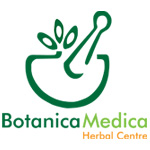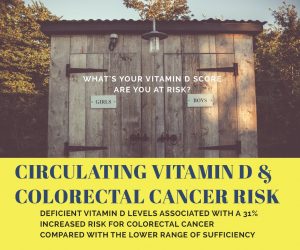WAHT’S YOUR VITAMIN D SCORE, ARE YOU AT RISK?
TAKE-HOME MESSAGE
* This pooled analysis of 17 cohorts was designed to evaluate the impact of circulating vitamin D levels on colorectal cancer risk. Deficient vitamin D levels (<30 nmol/L) were associated with a 31% increased risk for colorectal cancer compared with the lower range of sufficiency.
* Vitamin D at levels above sufficiency were associated with 27% reduced risk for colorectal cancer compared with the lower range of sufficiency.
– Neil Majithia, MD
BACKGROUND
Experimental and epidemiological studies suggest a protective role for vitamin D in colorectal carcinogenesis, but evidence is inconclusive. Circulating 25-hydroxyvitamin D (25(OH)D) concentrations that minimize risk are unknown. Current Institute of Medicine (IOM) vitamin D guidance is based solely on bone health.
METHODS
We pooled participant-level data from 17 cohorts, comprising 5706 colorectal cancer case participants and 7107 control participants with a wide range of circulating 25(OH)D concentrations. For 30.1% of participants, 25(OH)D was newly measured. Previously measured 25(OH)D was calibrated to the same assay to permit estimating risk by absolute concentrations. Study-specific relative risks (RRs) for prediagnostic season-standardized 25(OH)D concentrations were calculated using conditional logistic regression and pooled using random effects models.
RESULTS
Compared with the lower range of sufficiency for bone health (50-<62.5 nmol/L), deficient 25(OH)D (<30 nmol/L) was associated with 31% higher colorectal cancer risk (RR = 1.31, 95% confidence interval [CI] = 1.05 to 1.62); 25(OH)D above sufficiency (75-<87.5 and 87.5-<100 nmol/L) was associated with 19% (RR = 0.81, 95% CI = 0.67 to 0.99) and 27% (RR = 0.73, 95% CI = 0.59 to 0.91) lower risk, respectively. At 25(OH)D of 100 nmol/L or greater, risk did not continue to decline and was not statistically significantly reduced (RR = 0.91, 95% CI = 0.67 to 1.24, 3.5% of control participants). Associations were minimally affected when adjusting for body mass index, physical activity, or other risk factors. For each 25 nmol/L increment in circulating 25(OH)D, colorectal cancer risk was 19% lower in women (RR = 0.81, 95% CI = 0.75 to 0.87) and 7% lower in men (RR = 0.93, 95% CI = 0.86 to 1.00) (two-sided Pheterogeneity by sex = .008). Associations were inverse in all subgroups, including colorectal subsite, geographic region, and season of blood collection.
CONCLUSIONS
Higher circulating 25(OH)D was related to a statistically significant, substantially lower colorectal cancer risk in women and non-statistically significant lower risk in men. Optimal 25(OH)D concentrations for colorectal cancer risk reduction, 75-100 nmol/L, appear higher than current IOM recommendations.
At Botanica Medica our Naturopaths are well aware of the importance of exercise, a good diet and the effect it can have on your life both physically and mentally. They come across lots of interesting studies and are always updating their knowledge. If you would like to make an appointment with one of our Naturopaths call Botanica Medica on 8271-1827 today. They are only to happy to share the knowledge they have gained through their studies and patient outcomes, and get you feeling better. Botanica Medica is located at 97 Glen Osmond Road, Eastwood and appointments are available Monday to Saturday including some after hours.
Refrences: Published in Oncology
Journal Scan / Research · June 21, 2018
Journal of the National Cancer Institute
Circulating Vitamin D and Colorectal Cancer Risk: An International Pooling Project of 17 Cohorts
Marjorie L McCullough Emilie S Zoltick Stephanie J Weinstein Veronika FedirkoMolin Wang Nancy R Cook A Heather Eliassen Anne Zeleniuch-Jacquotte Claudia AgnoliDemetrius Albanes Matthew J Barnett Julie E Buring Peter T Campbell Tess V ClendenenNeal D Freedman Susan M Gapstur Edward L Giovannucci Gary G GoodmanChristopher A Haiman Gloria Y F Ho Ronald L Horst Tao Hou Wen-Yi Huang Mazda JenabMichael E Jones Corinne E Joshu Vittorio Krogh I-Min Lee Jung Eun Lee Satu MännistöLoic Le Marchand Alison M Mondul Marian L Neuhouser Elizabeth A Platz Mark P PurdueElio Riboli Trude Eid Robsahm Thomas E Rohan Shizuka Sasazuki Minouk J SchoemakerSabina Sieri Meir J Stampfer Anthony J Swerdlow Cynthia A Thomson Steinar TretliSchoichiro Tsugane Giske Ursin Kala Visvanathan Kami K White Kana WuShiaw-Shyuan Yaun Xuehong Zhang Walter C Willett Mitchel H Gail Regina G ZieglerStephanie A Smith-Warner
JNCI: Journal of the National Cancer Institute, djy087, Published: 14 June 2018
Artwork created in Canva


Recent Comments